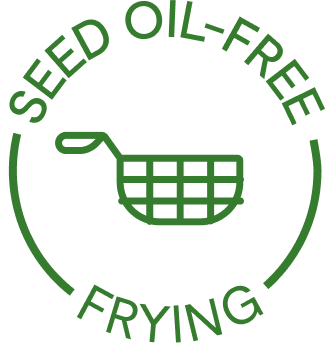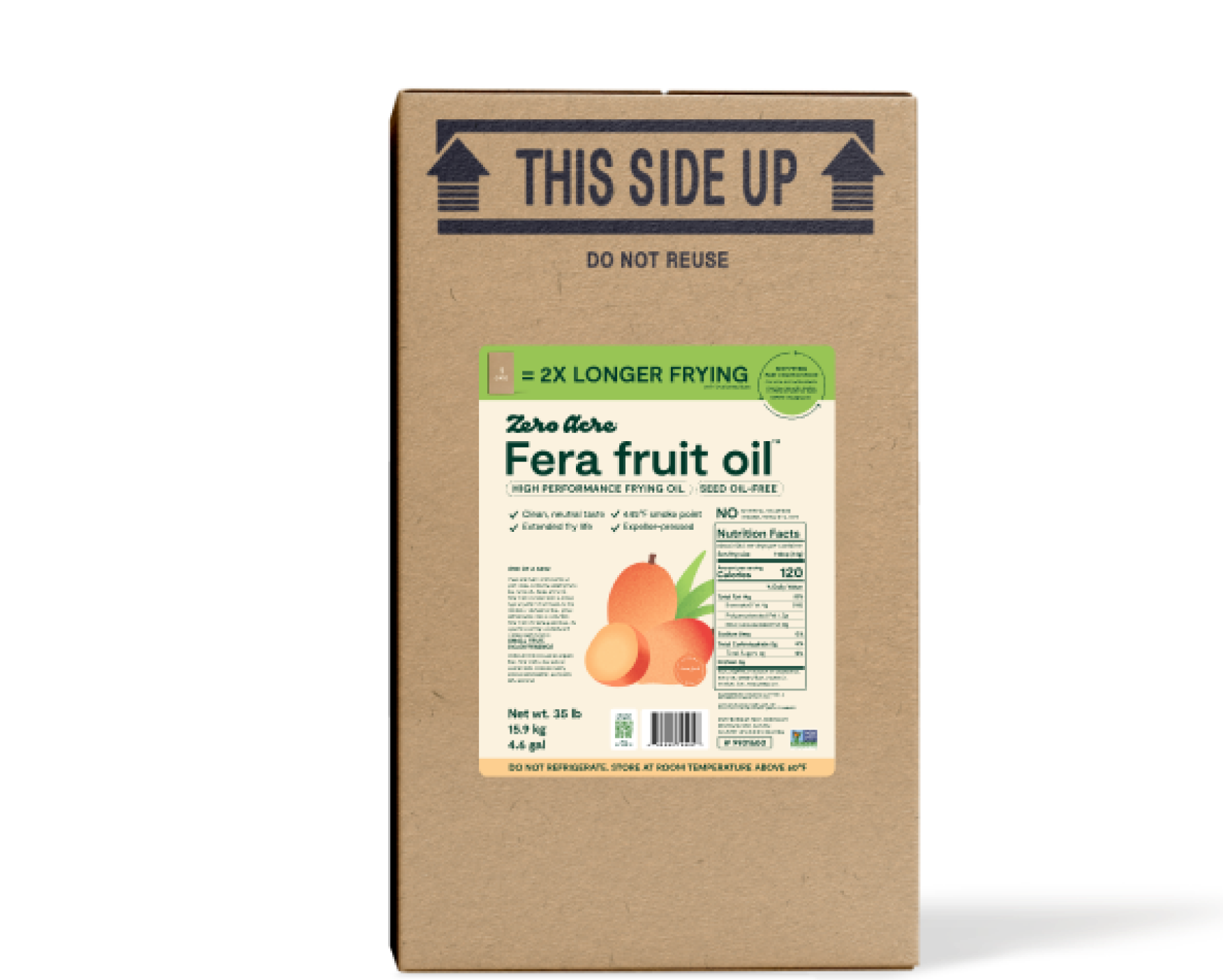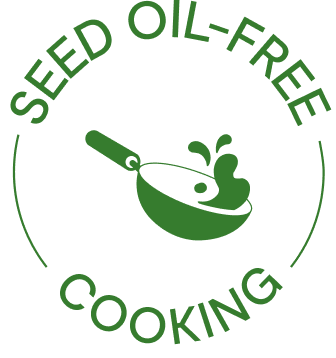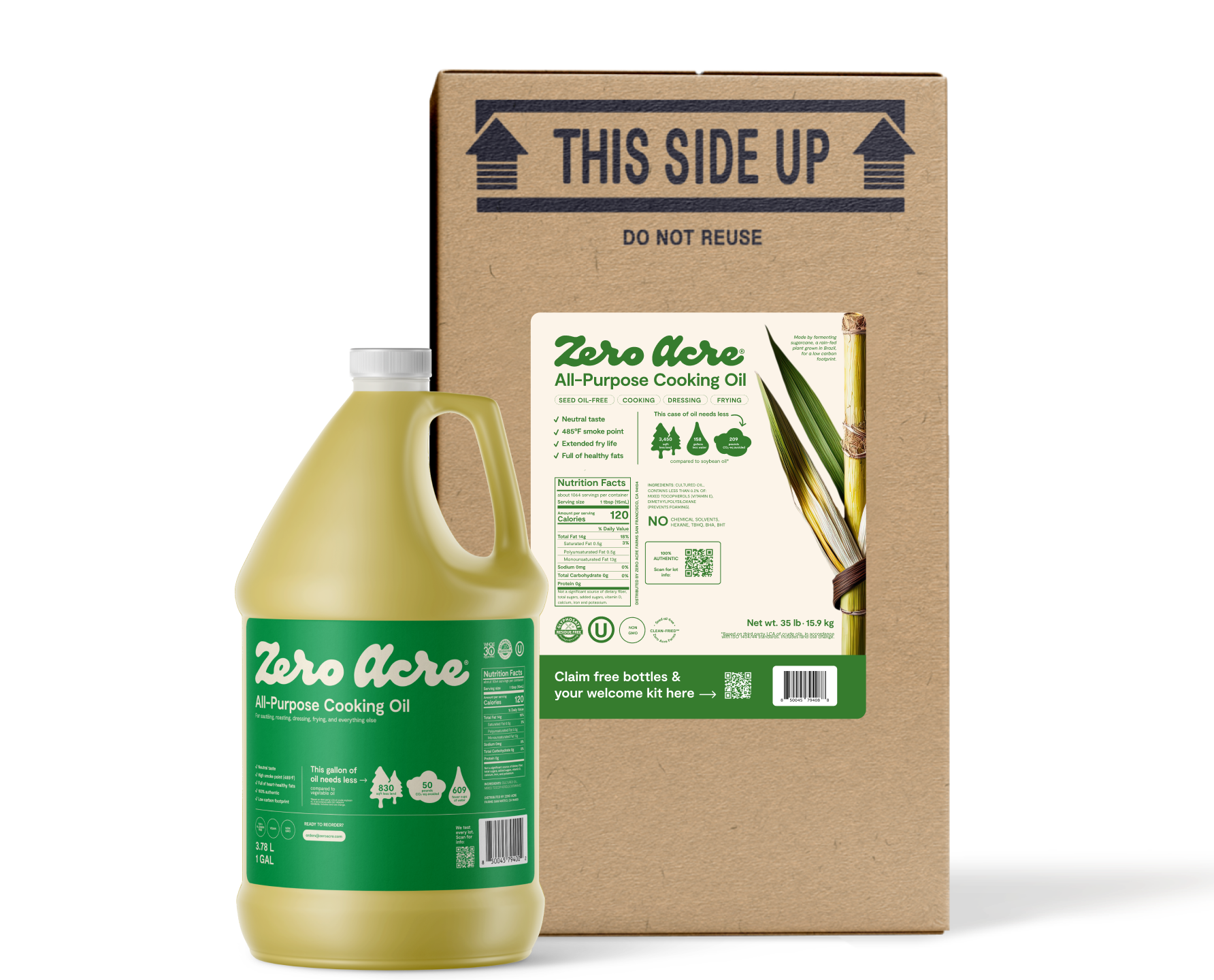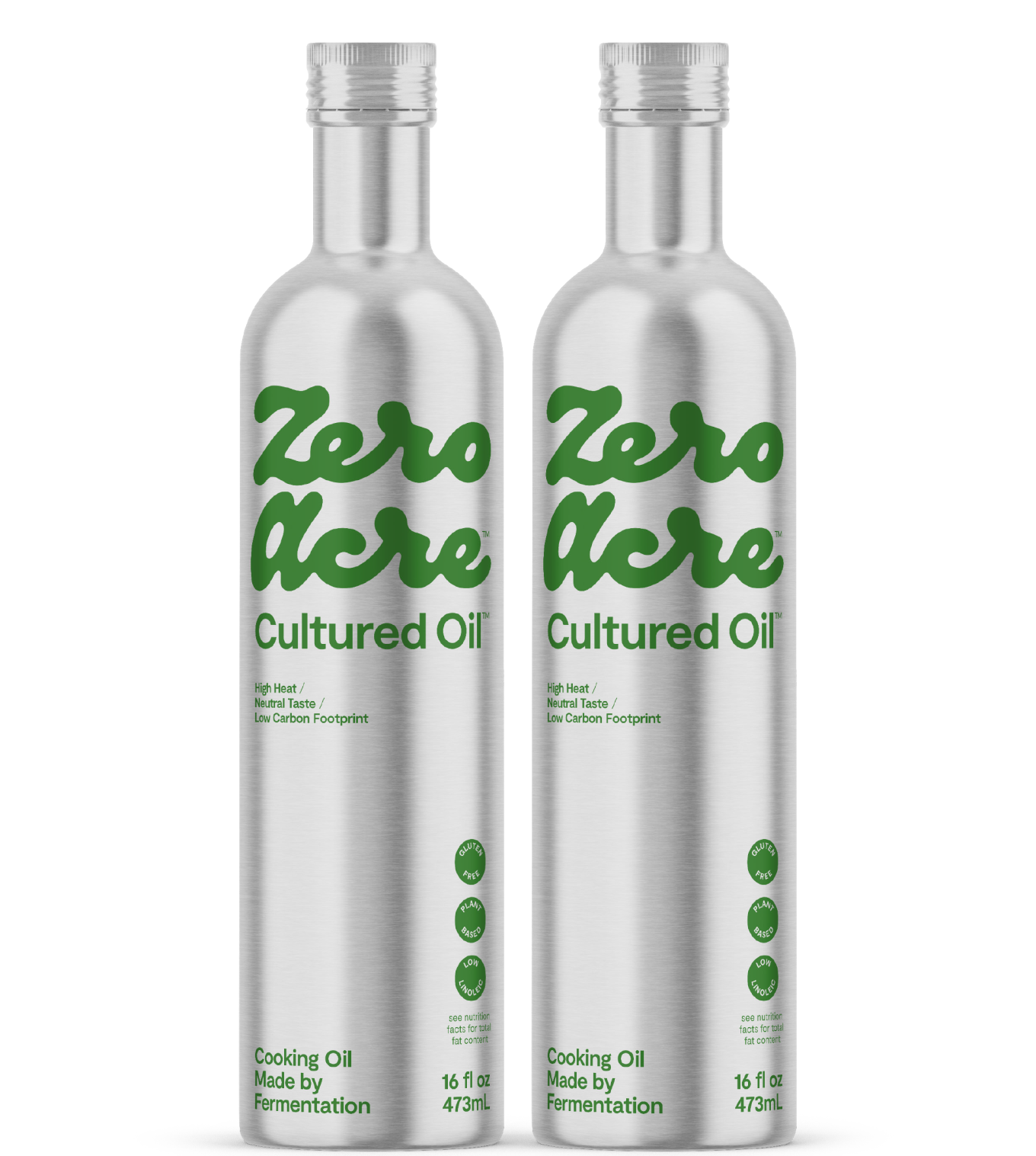WRITTEN BY: Corey Nelson
Article at a Glance
Nut butters often contain several added ingredients like seed oils and sugar. Be sure to look for nut butters that contain only one or two ingredients like nuts and salt.
Though nut butters are calorically dense, they can be healthy in moderation and provide a rich source of certain vitamins and minerals
Some nut butters are relatively high in omega-6 linoleic acid, making them less-than-ideal as a daily snack.
By making nut butter at home, you can easily save 40% or more compared to retail nut butter products.
You can make your own low linoleic acid nut butter by mixing a one-to-one ratio of peanut butter powder and Zero Acre oil.
Introduction
Whether you prefer crunchy or creamy, nut butters are one of life's simple pleasures. And if you know what to look for, nut butter can be a healthy snack or fun addition to your favorite recipes.
Nuts are an excellent source of healthy fats, vitamins, minerals, and fiber — the problem is that some manufacturers add unnecessary ingredients for sweetness, flavor, or cost savings, which means some nut butters shouldn't be considered health foods.
In this guide, you'll learn about the healthiest types of nut butters with detailed nutrition info, brand recommendations, and recipes, but first, here's what you should keep in mind next time you shop for nut butter.
How to Choose a Healthy Nut Butter
The best nut butter products have short ingredient lists, often with just one ingredient: nuts. With the exception of a little bit of salt, or blends with more than one type of nut, it's generally best to avoid products that add any extra ingredients.
Ingredients like artificial flavors, sugar, or seed oils are unnecessary — it's difficult to improve on naturally delicious nut butter — and are usually a sign that the manufacturer is looking to save money or cut corners in terms of product quality.
Research suggests synthetic additives like artificial flavors, artificial sweeteners, or preservatives may be harmful to your gut microbiome [*]. And they likely serve no benefit to the average consumer, so you're better off skipping products that list them on the label.
Cane sugar and high-fructose corn syrup are sometimes added to nut butter products to "enhance" the flavor, but these ingredients don’t add any real nutritional value. High-quality nut butters have a subtle, yet balanced, natural sweetness.
When you look at a nut butter label, not only should the ingredients list not show sugar or related ingredients, but there should be zero grams of "added sugars" in the nutrition facts section. While most nut butters naturally contain a few grams of carbs (which are harmless), added sugars refer to sugary ingredients other than nut butter, like sugar or high-fructose corn syrup.
A common reason for ingredients like added sugar is to increase profit by substituting a less expensive ingredient (sugar) in place of a more expensive one (nuts). A leading national brand of peanut butter contains 3-4 grams of added sugars per 2-tablespoon (33-gram) serving. That's not a ton of sugar from a dietary perspective, but why not let the natural flavor of nuts shine in your snack or dish?
If you want extra sweetness, you can always add your own cane sugar, honey, or a natural sugar substitute like monk fruit, stevia, or allulose without paying extra for low-quality pre-mixed products.
Finally, many nut butters contain added seed oils like soybean oil, sunflower oil, or grapeseed oil. These ingredients serve a similar purpose to added sugar as an inexpensive filler but there's another issue: they're high in inflammatory omega-6 linoleic acid.
Excess linoleic acid intake is linked with chronic health issues like inflammation, obesity, heart disease, cancer, and more. Seed oils used as cooking oils and ingredients in processed foods are the single biggest source of linoleic acid in modern diets.
Avoiding nut butters with added seed oils is easy, especially since seed oils don't add any benefit in terms of taste or texture.
The 10 Healthiest Nut Butters
These are the healthiest nut butters, including some nutrition information and recommended brands. This list isn't a ranking from healthiest to least healthy, but we've provided some information so you can make fully informed decisions that suit your nutrition and health goals.
Any type of nut butter can be healthy in moderation (provided it doesn't contain unnecessary ingredients like added sugar and seed oils), although some people may choose to limit their consumption due to the caloric density of nuts.
Fortunately, research shows that nuts are also very filling and satisfying, so for most people, eating nut butter or nuts daily won’t significantly increase your caloric intake [*]. You can enjoy a daily nut butter snack and chances are, it won't result in gaining unwanted weight. On the flipside, adding some nut butter to your meals can help you bulk up if you’re looking to gain weight.
Macadamia Nut Butter
Macadamia nuts are high in fiber, low in digestible carbs, and a good source of magnesium, phosphorus, potassium, zinc, and selenium [*]. They're also high in heart-healthy monounsaturated fats and low in omega-6 linoleic acid, making for a healthy, delicious, naturally sweet nut butter.
Nutrition Facts
An ounce of macadamia nut butter contains [*]:
203 calories (kcal)
2 grams of protein
2.5 grams of fiber
2 grams of net carbs
22 grams of total fat
3.5 grams of saturated fat
Less than half a gram of omega-6 linoleic acid
Recommended Brands
Vör Pure Macadamia Nut Butter Spread: Premium, single-ingredient macadamia nut butter.
Wilderness Poets Raw Macadamia Nut Butter: Raw, salt-free macadamia nut butter made in micro-batches.
Blue Mountain Organics Macadamia Nut Butter: Stone-ground nut butter made from raw, sprouted macadamia nuts.
Peanut Butter
Peanut butter is the world's most popular nut butter, but often comes with unnecessary additives and fillers (like sugar or seed oil). Quality peanut butter is high in protein, a good source of fiber, and provides magnesium, phosphorus, potassium, zinc, copper, and vitamin E [*].
Nutrition Facts
An ounce of peanut butter contains [*]:
182 calories (kcal)
6.5 grams of protein
1.5 grams of fiber
5 grams of net carbs
14.5 grams of total fat
3 grams of saturated fat
3.5 grams of omega-6 linoleic acid
Recommended Brands
Vitacost Certified Organic Peanut Butter Smooth & Unsalted: The best deal on organic peanut butter.
Trader Joe's Creamy Unsalted Peanut Butter From Unblanched Peanuts: Widely available, reasonably priced single-ingredient peanut butter.
PBfit Pure Peanut, 100% Powdered Peanut Powder: An innovative, reduced-fat powdered product made from non-GMO peanuts.
Coconut Butter
Coconuts are a good source of fiber, potassium, and selenium [*]. Coconut butter, made from shredded or dried coconut meat, is a light, sweet, creamy, delicious nut butter that resembles coconut oil but with more texture (and additional protein, carbs and fiber).
Nutrition Facts
An ounce of coconut butter contains [*]:
190 calories (kcal)
2 gram of protein
4.5 grams of fiber
2 grams of net carbs
18 grams of total fat
16 grams of saturated fat
Less than half a gram of omega-6 linoleic acid
Recommended Brands
Kevala Organic Coconut Butter (8 lb): An extremely good deal on bulk organic coconut butter.
Artisana Organic Raw Vegan Coconut Butter: This pureed organic coconut butter is perfect for spreading.
Almond Butter
Almonds are a good source of protein, fiber, calcium, iron, magnesium, phosphorus, potassium, zinc, copper, manganese, and vitamin E [*]. Use almond butter anywhere you would normally use peanut butter.
Nutrition Facts
An ounce of almond butter contains [*]:
165 calories (kcal)
6 gram of protein
3.5 grams of fiber
2.5 grams of net carbs
14 grams of total fat
1 gram of saturated fat
3.5 grams of omega-6 linoleic acid
Recommended Brands
Trader Joe's Creamy Almond Butter No Salt: The best deal on single-ingredient almond butter.
Jiva Organics Raw Sprouted Organic Almond Butter: Made with unpasteurized almonds, then soaked for 24 hours to sprout them before grinding.
Wilderness Poets Organic Almond Butter (7 Pound - 1 Gallon) - Save big by buying a bucket of raw, organic, unsweetened, salt-free almond butter.
Pistachio Nut Butter
Pistachios are a good source of protein, fiber, magnesium, phosphorus, and potassium [*]. Pistachio nut butter is earthy, slightly sweet, and decadent.
Nutrition Facts
An ounce of pistachio butter contains [*]:
160 calories (kcal)
5.5 gram of protein
3 grams of fiber
4.5 grams of net carbs
13 grams of total fat
1 gram of saturated fat
4 grams of omega-6 linoleic acid
Recommended Brands
Fiddyment Farms Pistachio Butter: Reasonably priced, single-ingredient pistachio butter.
Nutrawbar 100% Raw Organic Pistachio Butter: High-quality, raw organic pistachio nut butter.
Wilderness Poets WPBulk Organic Pistachio Butter - Excellent prices for 7 lb (1 gallon) and up.
Hazelnut Butter
Hazelnuts, also called filberts, are a good source of monounsaturated fats, fiber, iron, magnesium, phosphorus, potassium, copper, and vitamin E [*]. Hazelnut butter is delicious by itself, and you can use it as a base for DIY chocolate hazelnut spread and other tasty treats.
Nutrition Facts
An ounce of hazelnut butter contains [*]:
175 calories (kcal)
4 gram of protein
2.5 grams of fiber
2 grams of net carbs
17 grams of total fat
1 gram of saturated fat
2 grams of omega-6 linoleic acid
Recommended Brands
Vör Pure Hazelnut Butter Spread: Premium single-ingredient hazelnut butter.
Artisana Organics Hazelnut Cacao Spread: This organic blend includes coconut sugar and cacao along with hazelnuts, but it's also reasonably priced and delectable.
Walnut Butter
Walnuts are a good source of fiber, calcium, magnesium, phosphorus, potassium, and copper [*]. However, they are relatively high in omega-6 linoleic acid, so they're not an ideal choice as a daily staple.
The earthy, savory, slightly bitter taste of walnut butter pairs well with sweet or savory foods.
Nutrition Facts
An ounce of walnut butter contains [*]:
185 calories (kcal)
4.5 gram of protein
2 grams of fiber
2 grams of net carbs
18.5 grams of total fat
2 grams of saturated fat
11 grams of omega-6 linoleic acid
Recommended Brands
Crazy Go Nuts Organic Walnut Butter: Best deal on organic walnut butter.
Sun & Seed Raw Organic Walnut Butter Spread: Premium raw organic single-ingredient walnut butter.
Cashew Butter
Cashews are high in magnesium, phosphorus, potassium, zinc, copper, and monounsaturated fats [*]. Cashew butter has a mild, light taste with a hint of sweetness and a creamy texture.
Nutrition Facts
An ounce of cashew butter contains [*]:
165 calories (kcal)
4.5 gram of protein
1 gram of fiber
8.5 grams of net carbs
13 grams of total fat
2.5 grams of saturated fat
2 grams of omega-6 linoleic acid
Recommended Brands
Blue Mountain Organics Bulk Cashew Butter (8 lb): The most economical raw organic cashew butter.
Octonuts Dry Roasted Pure Cashew Nut Butter: Budget-friendly dry-roasted cashew butter.
Pecan Butter
Pecans are low in digestible net carbs and a good source of calcium, magnesium, phosphorus, potassium, zinc, copper, and monounsaturated fats [*]. The unique, rich flavor and texture of pecan butter make it equally at home in sweet or savory dishes, as a stuffing ingredient, or as a snack.
Nutrition Facts
An ounce of pecan butter contains [*]:
195 calories (kcal)
2.5 gram of protein
2.5 gram of fiber
1 grams of net carbs
20.5 grams of total fat
2 grams of saturated fat
6 grams of omega-6 linoleic acid
Recommended Brands
Pecan Shop Texas Native Pecan Butter: Premium wild-harvested, raw, sprouted, single-ingredient pecan butter.
Guidry Organic Farms Organic Pecan Butter: Lightly salted, small-batch handmade organic pecan butter.
Wilderness Poets Organic Raw Pecan Butter Organic, Bulk (4 lb): Budget-friendly raw, organic pecan butter.
Nut Butter Blends
Buying or making your own nut butter blends opens up a nearly endless number of possibilities. You can strike a balance between sweet and savory flavors, or add a smooth, creamy ingredient like coconut butter to an old favorite for an entirely different texture.
You can also save money on multi-nut blends compared to buying expensive single-ingredient nut butters like pistachio or hazelnut.
The same rules of thumb apply for buying nut butter blends. Look for quality products that have as few ingredients as possible, and preferably only nuts listed on the label. Avoid fillers like sugar and seed oils.
Recommended Brands
NuttZo Organic Power Fuel: Reasonably priced, organic blend of cashews, almonds, brazil nuts, flax seeds, chia seeds, hazelnuts, pumpkin seeds, and celtic sea salt.
Kirkland Signature Mixed Nut Butter: Economical and tasty blend of dry-roasted almonds and cashews with pumpkin, chia, and flax seeds.
Nutrawbar 100% Raw Pistachio + Macadamia Butter: Premium raw organic blend.
How to Make Nut Butter at Home
Making your own nut butter is easy, takes as little as 30 minutes, and can save you money compared to store-bought products. All you need to get started are quality nuts, a food processor or high-speed blender, and any optional ingredients like salt or cacao.
First, let's talk about the economics of making homemade nut butter. How much money can you actually save, and is it worth it?
Kirkland Creamy Almond butter from Costco costs around $27 for two 27-ounce containers, 54 ounces total, or about 50 cents per ounce. In comparison, you can buy 48 ounces (3 pounds) of bulk almonds for about $14, or around 30 cents per ounce.
Making your own nut butter could save you at least 40% compared to buying it, or even more if we compare the savings on premium brands rather than discount (Costco). That's significant.
You do need a quality food processor or a high-speed blender like a Vitamix. Normal blenders won't do the trick because they don't have the horsepower.
The 30-minute time investment (including clean-up) is relatively small, but might be important depending on how much you value your time. But if you make a large enough batch of nut butter — or devise a particularly delicious recipe — it's probably worth it!
What about raw versus roasted? It's mostly personal preference based on the flavors, but raw nut butters may have a slightly higher nutritional value on average and tend to have a shorter shelf life. Roasting nuts can break down the polyunsaturated fatty acids, contributing to rancidity.
If you choose the roasted route, you can buy roasted nuts or buy raw and roast them in the oven before you process them into nut butter. Roast your nuts for 15-20 minutes in the oven on a baking sheet at 325°F, checking regularly to make sure they aren't burning.
Making the nut butter is easy:
Weigh the nuts before you add them to the blender or food processor.
Optionally, add sea salt to taste: a 1/4 teaspoon per pound of nuts works well.
Blend or process on a high setting until they reach your desired consistency, usually between 5 and 10 minutes.
If you want to add extra dry ingredients, you can add them before blending or at any stage prior to completion, depending on the texture you want. Here are some of our favorite ideas:
Raw cacao or other yummy chocolate
Dates, dried berries, or other dried fruit
Coffee beans (an ounce of arabica beans has around 500 milligrams of caffeine, so don't go overboard!)
Matcha powder for a kick of caffeine and antioxidants
Chia seeds, pumpkin seeds, or other seeds for a boost in crunchiness and nutrition
Monk fruit extract, stevia, or allulose for sugar-free sweetening
Stir in granola for some extra crunch
Add a small amount of vanilla extract or maple syrup — just don’t go overboard or your nut butter will be too thin
That's it! Use a spatula to scrape your homemade nut butter into a jar or other sealed food storage container, refrigerate to preserve freshness and prevent natural oil separation, and you're finished. You can also freeze nut butter for long-term storage.
Homemade Nut Butter Alternatives
For a low-calorie, lower-fat version of nut butter, powdered peanut butter is an interesting option. This product is made the same way as peanut butter, then pressed to remove oils, leaving mainly protein and fiber. It's literally a powder that tastes like peanut butter and can be used similarly.
The two most popular peanut butter powder brands are PB2 and Naked Nutrition.
With either of these products, you can make a nut butter paste by adding water. Use a two-to-one ratio of water to powder for a spreadable paste, or a one-to-one ratio for a more buttery consistency (like normal peanut butter).
But the big reason peanut butter powder caught our eye is that you can also mix your own low-omega-6 peanut butter. Using a healthy fat low in linoleic acid to reconstitute peanut butter powder is a great way to enjoy delicious peanut butter and minimize your intake of inflammatory omega-6.
We recommend mixing a one-to-one ratio of peanut butter powder and Zero Acre oil. With over 90% heart-healthy monounsaturated fat and just 3% linoleic acid, Zero Acre oil is an exciting new option to reduce your omega-6 intake.
The Takeaway
Nut butter is naturally delicious, and the simplest products are usually the healthiest (and tastiest).
There's nothing too complicated about shopping for nut butters. Always read the label and try your best to avoid products that contain added sugar, seed oils, artificial flavoring, and other unnecessary additives. The fewer ingredients, the better — a single-ingredient nut butter is generally best.
If you're feeling creative, you can also make your own at home easily using an oven and a food processor or blender to roast and grind your own nuts into nut butter. You can easily save 40% or more compared to retail nut butter products, or even more if you buy nuts in bulk.

The Ultimate Guide to Healthy Oils and Fats: 40+ Options Compared
Fats are an important source of energy in your diet. The key is to zero in on wholesome, nutritious fat sources that match your dietary needs and priorities.
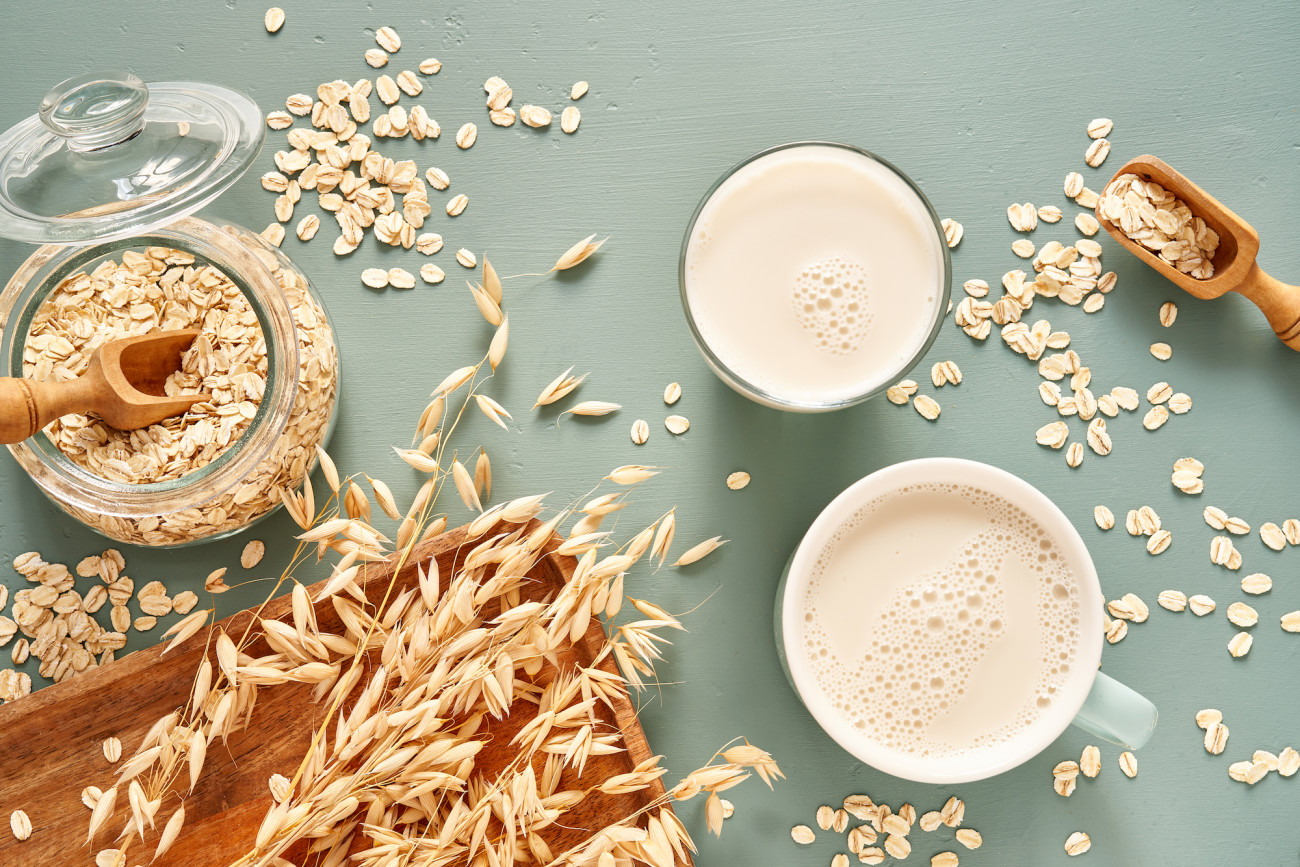
13 Seed Oil-Free Coffee Creamer Alternatives
Choose (or make!) a coffee creamer without added seed oils to get the most health benefits out of your daily cup of joe.

Why Are Vegetable Oils in My Coffee Creamer?
Both dairy and non-dairy creamers are a popular coffee addition, but are often filled with hidden vegetable oil that may contribute harmful health effects.

